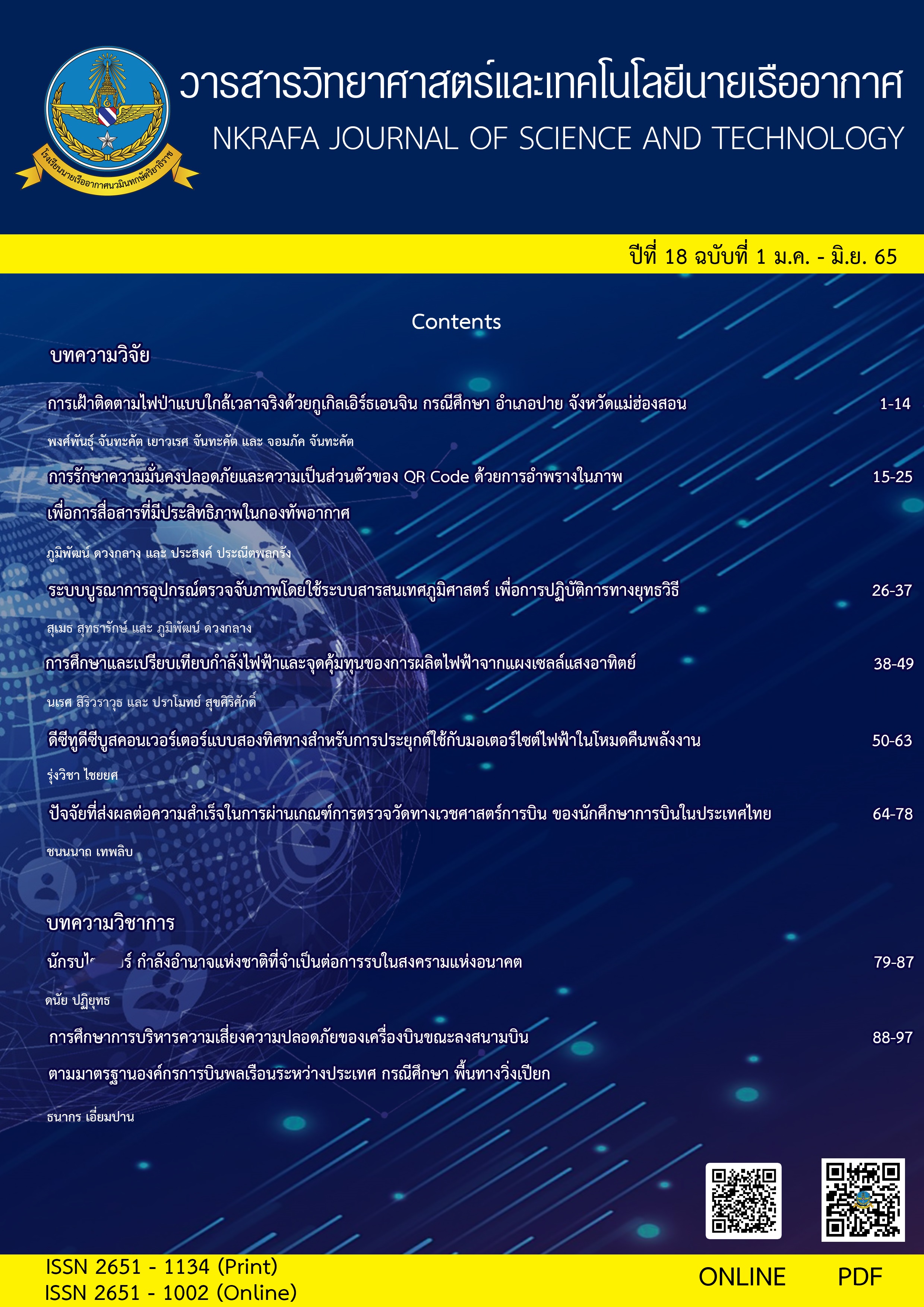Bi-Directional DC-DC Boost Converter for Electric Bike Applications in Regenerative Mode
Main Article Content
Abstract
Due to the limitation of battery capacity, the electric vehicle has maximum distance traveled that depends only on the battery size, Thus. The paper presents a bi-directional DC to DC boost converter circuit that can rechargeable batteries. The operation has divided into two modes is operate in driving mode, and operate in power return mode or regenerative mode . The research has design for lightweight vehicles, thus. the 1 cell power source 12 volt battery is selected for boost voltage to 48 volt. The output voltage supply to H-bridge inverter and to drive 48 volt permanent magnet DC motors. In this research use the computer program MATLAB/Simulink for simulate the operation of the entire system. The simulation result show that the ripple current not exceed 1 amp, the ripple voltage not exceed 1 volt and the duty cycle is 75% as designed. The proposed system can operation in both modes, especially in regenerative mode, the maximum regenerative power is 35 kilowatts.
Article Details

This work is licensed under a Creative Commons Attribution-NonCommercial-NoDerivatives 4.0 International License.
- Content and information in articles published in NKRAFA Journal of Science and Technology are comment and responsibility of authors of articles directly. Journal editorial do no need to agree or share any responsibility.
- NKRAFA Journal of Science and Technology Articles holds the copyright of the content, pictures, images etc. which published in it. If any person or agency require to reuse all or some part of articles, the permission must be obtained from the NKRAFA Journal of Science and Technology.
References
K. Hemasuk and S. Po-Ngam. (2017). The simplified regenerative boost converter for electric vehicle applications. International Electrical Engineering Congress (iEECON). 5 (1-4). Pattaya, Thailand.
M. M. Rahman, M. N. Uddin and M. K. Islam. (2015). Integration of bi-directional DC-DC converter and highly efficient boost converter for electric vehicles applications. IEEE 11th International Conference on Power Electronics and Drive Systems. 11 (687-691). Sydney, NSW, Australia.
X. Li, W. Zhang, H. Li, R. Xie and D. Xu.(2011). Design and control of bi-directional DC/DC converter for 30kW fuel cell power system. 8th International Conference on Power Electronics - ECCE Asia. (1024-1030). Jeju, Korea (South).
R. Das and M. A. UddinChowdhury. (2015). PI controlled Bi-directional DC-DC converter (BDDDC) and highly efficient boost converter for electric vehicles. 3rd International Conference on Electrical Engineering and Information Communication Technology (ICEEICT). 3 (1-5). Dhaka, Bangladesh.
Y. Lee, A. Khaligh and A. Emadi. (2009) .Advanced Integrated Bidirectional AC/DC and DC/DC Converter for Plug-In Hybrid Electric Vehicles. IEEE Transactions on Vehicular Technology. 58(8): 3970-3980.
S. Mehta, H. Mittal and N. Venkatesan (2014) .Design and implementation of intelligent controller based boost
converter for Electric Vehicle applications. IEEE Student Conference on Research and Development .(1-6). Penang, Malaysia
Anuja, N., & Harshal, S. (2014). Unipolar and Bipolar PWM Inverter. International Journal for Innovative Research in Science & Technology, 1(7): 237-243.
S. A. Azmi, A. A. Shukor and S. R. A. Rahim. (2018) .Performance Evaluation of Single-Phase H-Bridge Inverter Using Selective Harmonic Elimination and Sinusoidal PWM Techniques. IEEE 7th International Conference on Power and Energy (PECon). (67-72). Kuala Lumpur, Malaysia.
Lining Zhou. (2005). Evaluation and DSP Based Implementation of PWM Approaches for Single-Phase DC-AC Converters. (The degree of Master of Science, The florida state university famu-fsu college of engineering).


